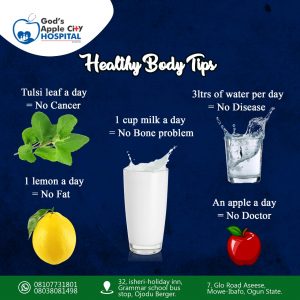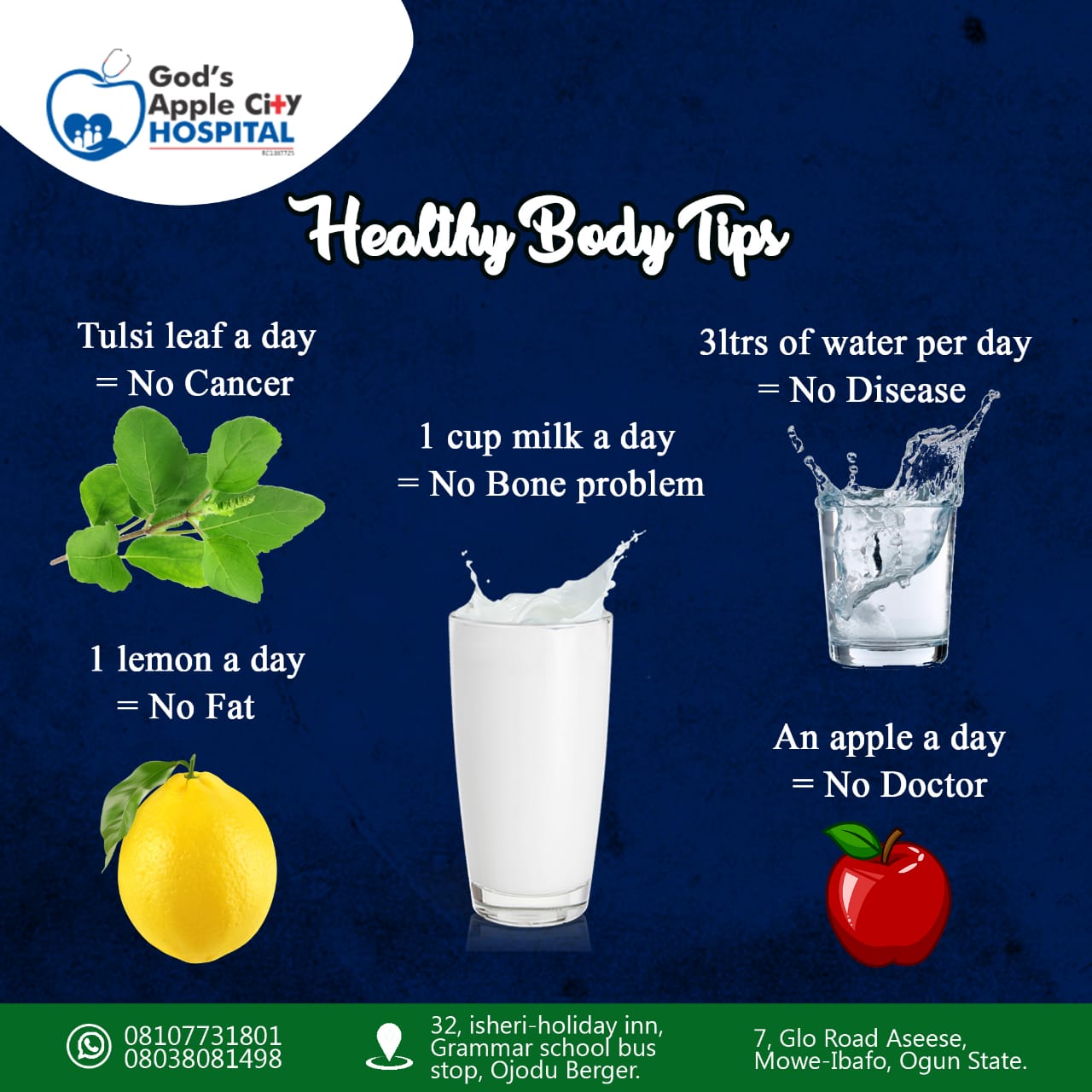Healthy Body Tips
Tulsi
Tulsi is used in various forms such as dried, fresh, powdered, essential oil, and herbal tea. The herb is believed to reduce inflammation in the body and remove “toxins.” It is believed to protect the body from harmful free radicals.
Some of the proposed health benefits of tulsi include:
-
Boosts immunity and prevents infections
-
Helps manage stress and anxiety
-
Aids digestion
-
Helps lower blood pressure
-
Helps manage high blood cholesterol levels
-
Promotes gum and teeth health
-
Boosts the metabolism and helps manage weight
-
Helps regulate blood sugar and manage diabetes
-
Helps treat breathing problems such as asthma and bronchitis
-
Retards aging process due to antioxidant properly
-
Expedites wound healing
-
Helps manage cold and flu
-
Relieves headache
-
Reduces swelling and pain
-
Helps recover from infections such as malaria and tuberculosis
-
Acts as a safe and natural mosquito repellent
-
Maintains heart health
-
Improves memory and brain health
-
Helps manage fever
-
Enhances sexual health
-
Promotes restful sleep
-
Helps control acne and other skin conditions
-
Makes hair healthy and shiny and prevents hair loss
-
Promotes eye health
-
Relieves mensural cramps
-
Helps manage arthritis
-
Relieves the irritation and itching caused by bug bites
-
Helps prevent cancer
Lemon
Lemons are high in vitamin C, fiber, and various beneficial plant compounds. These nutrients are responsible for several health benefits. In fact, lemons may support heart health, weight control, and digestive health.
7 benefit of Lemon water
-
It promotes hydration.
-
It’s a good source of vitamin C.
-
It supports weight loss.
-
It improves your skin quality.
-
It aids digestion.
-
It freshens breath.
-
It helps prevent kidney stones.
Milk
Milk Is Packed with Nutrients
Milk is an excellent source of vitamins and minerals, including “nutrients of concern,” which are under-consumed by many populations. It provides potassium, B12, calcium and vitamin D, which are lacking in many diets. Milk is also a good source of vitamin A, magnesium, zinc and thiamine (B1).
Additionally, it’s an excellent source of protein and contains hundreds of different fatty acids, including conjugated linoleic acid (CLA) and omega-3.
Conjugated linoleic acid and omega-3 fatty acids are linked to many health benefits, including a reduced risk of diabetes and heart disease.
Also, organic and grass-fed cow’s milk contains higher amounts of beneficial antioxidants, such as vitamin E and beta-carotene, which help reduce inflammation and fight oxidative stress.
It’s A Good Source of Protein
Milk is a rich source of protein, with just one cup containing 8 grams.
Protein is necessary for many vital functions in your body, including growth and development, cellular repair and immune system regulation.
Milk is considered a “complete protein,” meaning it contains all nine of the essential amino acids necessary for your body to function at an optimal level.
There are two main types of protein found in milk — casein and whey protein. Both are considered high-quality proteins.
Casein makes up the majority of the protein found in cow’s milk, comprising 70–80% of the total protein content. Whey accounts for around 20%.
Whey protein contains the branched-chain amino acids leucine, isoleucine and valine, all of which are linked to health benefits.
Branched-chain amino acids may be particularly helpful in building muscle, preventing muscle loss and providing fuel during exercise.
Drinking milk is associated with a lower risk of age-related muscle loss in several studies.
In fact, higher consumption of milk and milk products has been linked to greater whole-body muscle mass and better physical performance in older adults.
Milk has also been shown to boost muscle repair in athletes.
In fact, several studies have demonstrated that drinking milk after a workout can decrease muscle damage, promote muscle repair, increase strength and even decrease muscle soreness.
Plus, it’s a natural alternative to highly processed protein drinks marketed toward post-workout recovery.

Water
This substance makes up a majority of your body weight and is involved in many important functions, including:
-
flushing out waste from your body
-
regulating body temperature
-
helping your brain function
You get most of your water from drinking beverages, but food also contributes a small amount to your daily water intake.
1. It helps create saliva
Water is a main component of saliva. Saliva also includes small amounts of electrolytes, mucus, and enzymes. It’s essential for breaking down solid food and keeping your mouth healthy.
Your body generally produces enough saliva with regular fluid intake. However, your saliva production may decrease as a result of age or certain medications or therapies.
If your mouth is drier than usual and increasing your water intake isn’t helping, see your doctor.
2. It regulates your body temperature
Staying hydrated is crucial to maintaining your body temperature. Your body loses water through sweat during physical activity and in hot environments.
Your sweat keeps your body cool, but your body temperature will rise if you don’t replenish the water you lose. That’s because your body loses electrolytes and plasma when it’s dehydrated.
If you’re sweating more than usual, make sure you drink plenty of water to avoid dehydration.
3. It protects your tissues, spinal cord, and joints
Water consumption helps lubricate and cushion your joints, spinal cord, and tissues. This will help you enjoy physical activity and lessen discomfort caused by conditions like arthritis.
4. It helps excrete waste through perspiration, urination, and defecation
Your body uses water to sweat, urinate, and have bowel movements.
Sweat regulates body temperature when you’re exercising or in warm temperatures. You need water to replenish the lost fluid from sweat.
You also need enough water in your system to have healthy stool and avoid constipation.
Your kidneys are also important for filtering out waste through urination. Adequate water intake helps your kidneys work more efficiently and helps to prevent kidney stones.
5. It helps maximize physical performance
Drinking plenty of water during physical activity is essential. Athletes may perspire up to 6 to 10 percent of body weight during physical activity.
Hydration also affects your strength, power, and endurance.
You may be more susceptible to the effects of dehydration if you’re participating in endurance training or high-intensity sports such as basketball.
Negative effects of exercise in the heat without enough water can include serious medical conditions, like decreased blood pressure and hyperthermia. Extreme dehydration can cause seizures and even death.
6. It helps prevent constipation
Eating fiber isn’t the only way to prevent constipation. It’s also important to maintain your water intake so your bowel movements contain enough water.
If you don’t consume enough water, magnesium, and fiber, you may be more likely to experience constipation.
If you’re already constipated, you may find that drinking carbonated water as well as plain water can help ease your symptoms.
7. It aids in digestion
Contrary to what some believe, experts confirm drinking water before, during, and after a meal will help your body break down the food you eat more easily. This will help you digest food more effectively and get the most out of your meals.
Research shows the body adapts to changes in the consistency of food and stomach contents, whether more solid or more liquid.
8. It helps with nutrient absorption
In addition to helping with food breakdown, water also helps dissolve vitamins, minerals, and other nutrients from your food. It then delivers these vitamin components to the rest of your body for use.
9. It helps you lose weight
Studies have linked body fat and weight loss with drinking water in both overweight girls and women. Drinking more water while dieting and exercising may just help you lose extra pounds.
10. It improves blood oxygen circulation
Water carries helpful nutrients and oxygen to your entire body. Reaching your daily water intake will improve your circulation and have a positive impact on your overall health.
11. It helps fight off illness
Drinking enough water can help prevent certain medical conditions. These include:
-
constipation
-
kidney stones
-
exercise-induced asthma
-
urinary tract infection
-
hypertension
Water also helps you absorb important vitamins, minerals, and nutrients from your food, which will increase your chances of staying healthy.
12. It helps boost energy
Drinking water may activate your metabolism. A boost in metabolism has been associated with a positive impact on energy level.
One study found that drinking 500 milliliters of water boosted the metabolic rate by 30 percent in both men and women. These effects appeared to last over an hour.
13. It aids in cognitive function
Proper hydration is key to staying in tip-top cognitive shape. Research indicates that not drinking enough water can negatively impact your focus, alertness, and short-term memory.
14. It helps improve mood
Not getting enough water can also affect your mood. Dehydration may result in fatigue and confusion as well as anxiety.
15. It helps keep skin bright
Adequate water intake will help keep your skin hydrated and may promote collagen production. However, water intake alone isn’t enough to reduce the effects of aging. This process is also connected to your genes and overall sun protection.
16. It prevents overall dehydration
Dehydration is the result of your body not having enough water. And because water is imperative to so many bodily functions, dehydration can be very dangerous.
Severe dehydration can result in a number of severe complications, including:
-
swelling in your brain
-
kidney failure
-
seizures
Make sure you drink enough water to make up for what’s lost through sweat, urination, and bowel movements to avoid dehydration.
Apple
Apples are an exceptionally healthy fruit with many research-backed benefits.
Nutrition
Apples are also a rich source of polyphenols, an important group of antioxidants. Antioxidants are compounds that protect your cells from free radicals harmful molecules that contribute to the development of chronic conditions, like heart disease and cancer.
To get the most out of apples, leave the skin on, as it contains half of the fiber and most of the polyphenols.
Could help fight Asthma
Antioxidant-rich apples may help protect your lungs from oxidative damage.
An excess of harmful molecules called free radicals can cause oxidative damage. This may lead to inflammatory and allergenic responses in your body.
Apple skin is rich in the antioxidant quercetin, which can help regulate your immune system and reduce inflammation. Theoretically, this could make apples effective against late phases of bronchial asthma responses.
Similarly, other compounds found in apples, including ones called proanthocyanidins, may reduce or prevent allergic asthma airway inflammation.
.
.
.
.
.
.
.
.
.
.
https://web.facebook.com/Godsapplecity
read other blogs

